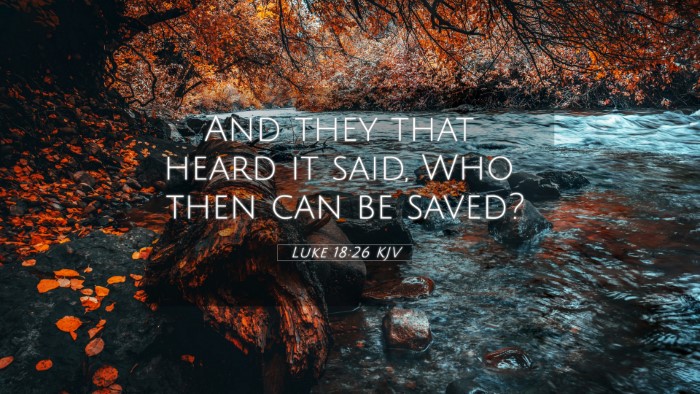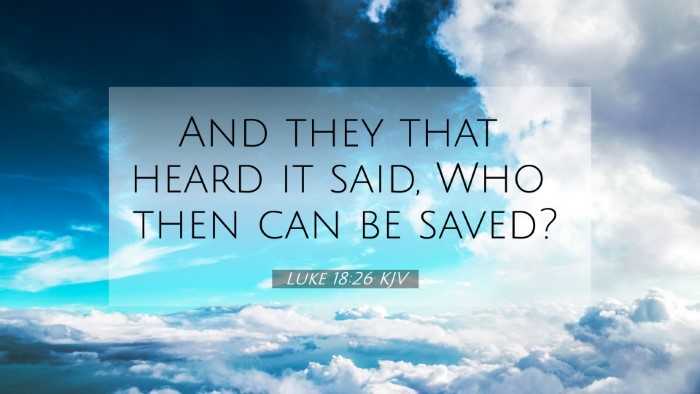Understanding Luke 18:26
Luke 18:26 states, "And they that heard it said, Who then can be saved?" This verse is found in the context of Jesus’ teachings on wealth and salvation, where He emphasizes the difficulty for the rich to enter the Kingdom of God.
Summary of Insights from Public Domain Commentaries
This analysis brings together insights from various commentaries to provide a clearer understanding of the implications of this verse.
Matthew Henry's Commentary
Matthew Henry notes that the disciples' question reflects a deeper concern about the nature of salvation. They were surprised by Jesus' statement regarding the rich, given their cultural understanding that wealth was often seen as a sign of God's blessing. Henry emphasizes that salvation is a work of God alone and not based on human effort or merit.
Albert Barnes' Notes
Albert Barnes elaborates on the astonishment of the disciples, suggesting that their reaction stems from the prevalent Jewish belief that riches indicated divine favor. He points out that the question mirrors a broader theological inquiry: if the seemingly blessed cannot be saved, what hope is there for anyone? Barnes highlights the importance of divine grace in salvation, affirming that it is not inherently tied to wealth or status.
Adam Clarke's Commentary
Adam Clarke brings a unique perspective by discussing the mindset of the disciples. He mentions that their question likely arises from a mixture of disbelief and curiosity about the nature of God's Kingdom. Clarke further stresses that regardless of one's social standing, all must rely on God's mercy to be saved, and emphasizes the universal call to repentance.
Thematic Connections and Cross-References
Luke 18:26 raises significant questions about wealth, expectations of salvation, and the nature of God's grace. It connects with various themes throughout the Bible:
- Matthew 19:24 - Jesus states it's easier for a camel to go through the eye of a needle than for a rich man to enter the Kingdom of Heaven.
- Mark 10:26 - Similar to Luke's account, the disciples express astonishment at Jesus' remarks about wealth and its relation to salvation.
- Luke 6:24 - "But woe to you who are rich, for you have already received your comfort." This verse warns the rich about their reliance on material wealth.
- 1 Timothy 6:9-10 - These verses caution against the love of money and its spiritual dangers, aligning with the thematic discussion of salvation.
- James 2:5 - "Listen, my dear brothers and sisters: Has not God chosen those who are poor in the eyes of the world to be rich in faith..." highlighting God's preferential treatment towards the humble.
- Proverbs 11:28 - "Those who trust in their riches will fall, but the righteous will thrive like a green leaf." This verse speaks to the dangers of placing hope in wealth.
- Matthew 5:3 - “Blessed are the poor in spirit, for theirs is the kingdom of heaven,” which emphasizes the attitude required to enter the Kingdom.
- Luke 12:15 - "Watch out! Be on your guard against all kinds of greed; life does not consist in an abundance of possessions." This reaffirms the message regarding wealth.
- John 3:3 - Jesus emphasizes the necessity of being "born again" to see the Kingdom of God, which underlines that salvation is not about worldly achievements but about spiritual rebirth.
- Acts 4:32-35 - This passage illustrates the early church's communal attitude towards possessions and wealth, showing a radical sharing among believers.
Conclusion
Luke 18:26 evokes profound contemplation on the intersection of wealth, salvation, and divine grace. As highlighted in the commentaries, the disciples' query reflects a common human dilemma concerning the assurance of salvation. It serves as an invitation to examine our own preconceptions about wealth and righteousness, recognizing that salvation is a gift from God, not something earned through human effort or status.
In studying this verse and its connections with other scriptures, we uncover a rich tapestry of biblical themes that encourage deeper reflection on our spiritual priorities and reliance on God’s grace. The use of tools for Bible cross-referencing can further facilitate a comprehensive understanding of these interrelated themes in the Scriptures.



